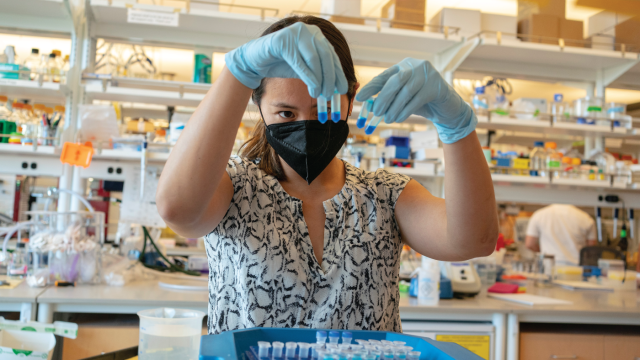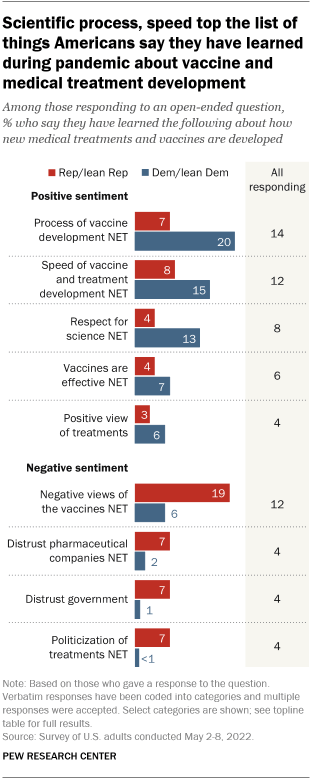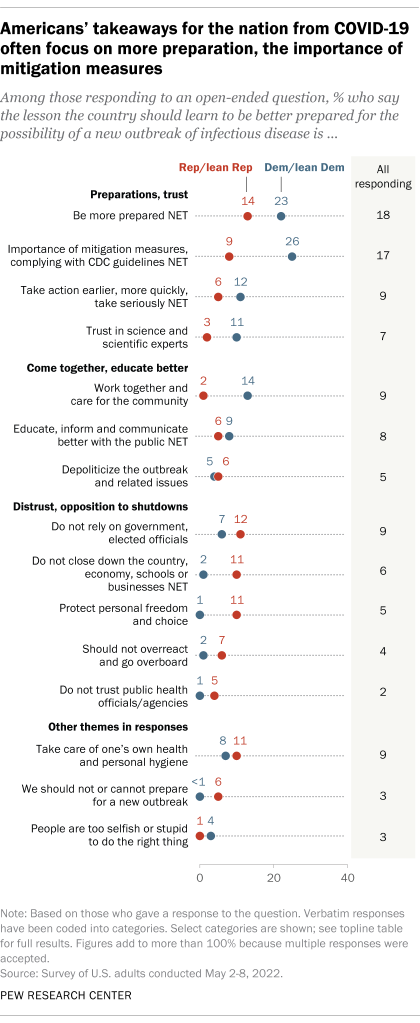
Americans have watched in real time as the country has moved to confront the threat posed by the coronavirus outbreak. Scientists have developed and tested vaccines and treatments for the virus at an unprecedented pace, while government leaders have grappled with appropriate policy response, attempting to balance public health and other considerations.
A recent Pew Research Center survey asked U.S. adults to say, in their own words, what they have learned from the COVID-19 pandemic. One set of respondents were asked what they learned about the development of vaccines and medical treatments, while another set were asked what they think the country should learn to be better prepared for a future outbreak of disease.
Pew Research Center conducted this study to understand Americans’ views about what they have learned from the COVID-19 pandemic. Open-ended responses come from a Center survey of 10,282 U.S. adults conducted May 2-8, 2022. One random subset of respondents was asked to describe what they learned during the coronavirus outbreak about how new medical treatments and vaccines are developed. Another random subset of respondents was asked about what lesson the country should learn from the coronavirus outbreak to be better prepared for the possibility of a new outbreak of infectious disease. Some responses quoted here have been lightly edited for style, brevity and readability.
Everyone who took part in the survey is a member of the Center’s American Trends Panel (ATP), an online survey panel that is recruited through national, random sampling of residential addresses. This way, nearly all U.S. adults have a chance of selection. The survey is weighted to be representative of the U.S. adult population by gender, race, ethnicity, partisan affiliation, education and other categories. Read more about the ATP’s methodology.
Here are the questions used for this analysis, along with responses, and its methodology.
As with a host of other views about the coronavirus outbreak, Americans’ thoughts about these questions are often divided along partisan lines. When thinking of lessons learned about the development of medical treatments and vaccines, Democrats and those who lean to the Democratic Party often mention appreciation for the vaccine development process and the speed at which vaccines and treatments were developed. Another top response is a respect for science generally.
By comparison, Republicans and those who lean to the GOP strike a more negative tone on lessons learned. Skepticism toward vaccines is the top response among Republicans, and mentions of distrust of the pharmaceutical industry and government officials are also relatively frequent.
Partisan differences are also prominent in the recommendations people would give to the country in the event of a future public health emergency. When asked what lesson the country should learn to be better prepared for the possibility of a future infectious disease outbreak, Democrats are particularly inclined to talk about the need for better preparation, greater trust of public health guidance and faster responses.
Better preparation was also a common response among Republicans. However, other frequent mentions differed in tone and included low trust in government officials and a need to avoid shutdowns and prevent limits on individual freedom.
What Americans learned about the development of vaccines and medical treatments

When asked what they learned about the development of new medical treatments and vaccines, Americans who provided their thoughts offered a broad range of sentiments ranging from increased scientific knowledge to distrust of aspects of the process. On balance, however, responses more often took a positive than negative tone.
Among the positives, the most common sentiment was a greater understanding of the scientific steps to develop vaccines and treatments and the use of mRNA technology, cited by 14% of those who responded. One respondent said, “I’ve learned more about the stages needed to approve a vaccine, like trial groups and approvals from FDA.”
Nearly as many – 12% of those who responded – mentioned the speed of vaccine development. As one respondent put it: “I learned that vaccine development can be expedited much more than I previously thought.”
Other responses that took a generally positive tone included mentions of respect for science and scientists (8% of those who responded). One respondent in this group said, “There are excellent scientists willing to work fast and hard to develop vaccines and treatments for us.”
Fewer survey respondents had negative things to say about what they learned about how new medical treatments and vaccines are developed. The most common of these was a negative view of the vaccines themselves (12% of those who responded), including the view that the vaccines are not effective or that they are experimental and rushed. One person said, “The vaccine is not a vaccine. It doesn’t fit the definition. It is a shot that might help or it might hurt you. Not worth the risk.” Another respondent expressed skepticism about the timeline of vaccine development, saying, “They were hastily made for the sake of profit, not to help or protect American citizens.”
Notably, some responses with a negative sentiment expressed distrust of government officials (4% of those who responded), pharmaceutical companies (4%) or public health officials (1%).
Democrats and Democratic-leaning independents were more inclined to mention positive lessons learned, whereas Republicans and Republican leaners were more likely to give a negative response. For example, 20% of Democrats who provided a response said they learned about the process of vaccine development, compared with 7% of Republicans who responded. Conversely, 19% of Republicans who responded expressed negative views of vaccines, compared with 6% of Democrats who answered the question.
In contrast to these partisan differences, similar shares of Republicans and Democrats who responded (16% and 15%, respectively) said they learned nothing about how new vaccines and medical treatments are developed.
Americans’ advice for handling a future infectious disease outbreak

When asked to consider the lessons the country should learn for a future infectious disease outbreak, Americans’ predominant responses included the need for greater preparation, the importance of mitigation efforts and acting quickly.
Almost two-in-ten of those who responded (18%) said the country needs more preparation and planning to be ready for a future outbreak. Specific suggestions included having emergency medical teams and making medical supplies readily available to the public.
“Fund a division of government to plan for this and stockpile materials that are kept up to date for use and make a system to rapidly develop and produce vaccines, tests, treatments,” wrote one respondent. Others gave general advice such as “Be more prepared” and “More equipment and supplies.”
Another common response, cited by 17% of those who responded, stressed the importance of mitigation measures and compliance with public health recommendations, such as masking and getting vaccinated. Some mentioned the need to take action more quickly (9% of those who responded), while a similar share (7%) said the country needs to trust scientific experts more. “Trust the medical professionals to recommend what is the best course of action to protect the most people,” wrote one respondent. Another put their views this way: “Listen to scientists and infectious disease experts more than politicians.”
Others highlighted the need for more unity to combat a future pandemic. About one-in-ten (9% of those who responded) mentioned the importance of working together and taking care of the larger community, while another 5% said that the country should not politicize a future outbreak as it did COVID-19. On a related theme, 8% of those who responded said the country needs to do a better job of educating the public, communicating information and combating misinformation about the pandemic.
However, respondents also cited lessons connected with feelings of dissatisfaction with how the coronavirus outbreak has been handled. Overall, 9% of those who responded said not relying on elected officials was a lesson for the country going forward; 6% said the country should learn not to close down the economy and schools in a future infectious disease outbreak. Less frequently, some respondents (2%) who shared a critical view of the country’s coronavirus response expressed distrust of public health officials or agencies.
Some Americans (3% who volunteered an answer) argued that we should not, or cannot, prepare for a future outbreak. One respondent with this view said, “They should have let it run its course instead of sending the country into a panic.”
Partisans often differed in the kinds of advice and recommendations they had for the country, as was also the case with views on vaccines and new medical treatments. Democrats and Democratic leaners were far more likely than Republicans and GOP leaners to mention the importance of mitigation measures and complying with CDC guidelines (26% vs. 9% of those who responded). Democrats were also more likely to cite a general need for more preparation and trust in scientific experts.
Republicans were more likely than Democrats to express distrust of government officials (12% vs. 7% of those who responded) and to advise against restrictions on businesses or schools (11% vs. 2%). Republicans were also more inclined than Democrats to mention the need to protect individual freedoms (11% vs. 1%). As one Republican put it, “Give the people the freedom to make their own decisions about what needs to be done, if anything.”
Note: Here are the questions used for this analysis, along with responses, and its methodology.




